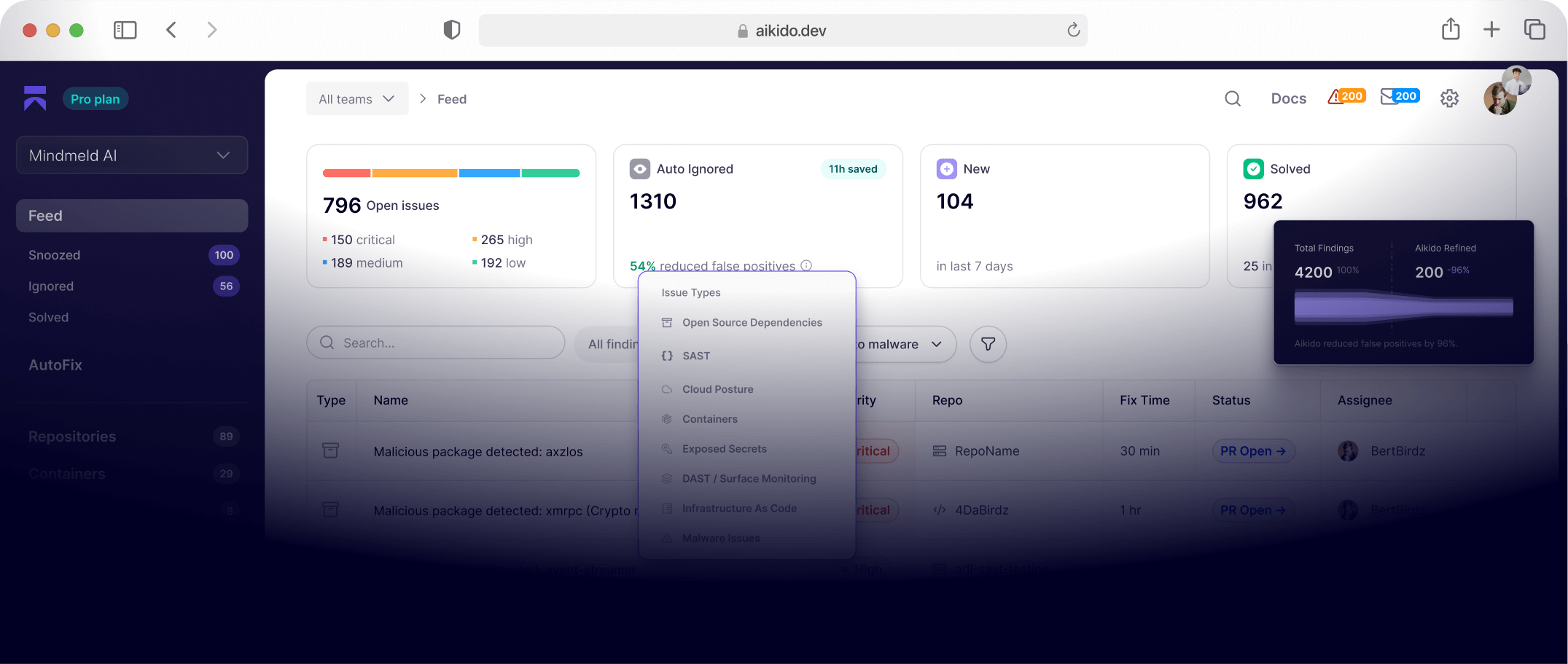Open-source dependencies
Learn why managing your open-source dependencies effectively for vulnerabilities and legal risk is crucial for modern software development and security.

Open-source dependencies
Open-source frameworks and libraries are Legos of the app development work—ready-made pieces you can snap together with a package manager to save time, avoid reinventing the wheel, and tap into community-vetted code for critical elements like cryptography. The ecosystem has untapped so much potential and velocity, but just like stepping on a Lego brick in the night, mismanaging these dependencies can easily come with unexpected and surprisingly sharp pain.
An example of open-source dependencies and how they work
For web applications, open-source dependencies come in three primary flavors:
When your project relies on Node.js, and Node.js relies on hundreds of other libraries, you also rely on them. Managing this sprawling ecosystem of third-, fourth-, and fifth-tier dependencies quickly becomes a real hassle.
Tools you leverage during development, like frameworks, build tools, code formatters or linters, and documentation generators. These are not required for the actual execution of your app, and are not included in production-ready builds.
Essential components your application requires to run successfully, like depending on a specific version of a MySQL for storing data or a runtime environment like Node.js.

How does managing open-source dependencies help developers?
Even the most popular and heavily developed open-source libraries can secretly house critical vulnerabilities that could impact your app, user experience, or even confidential customer data. By managing these dependencies, you can proactively mitigate risks instead of scrambling for a patch after the damage is done.
When you have complete visibility into the impact of updating your dependencies, you can benefit from bug fixes, performance improvements, and new features with far less risk.
Open-source licensing is a veritable minefield of legal risk, which could result in painful refactoring projects. With visibility into your current licensing ecosystem and the ability to track changes over time, you can safely benefit from these off-the-shelf components without creating even more headaches.

How to manage and scan open-source dependencies: an overview
You already know how to install and update dependencies, but what about scanning them for vulnerabilities and potential licensing risk? Unfortunately, the tooling ecosystem for scanning dependencies can feel very convoluted, leading many to passively rely on tools like Dependabot for GitHub or Dependency Scanning for GitLab.
Or with aikido
Best practices for effective open-source dependency management
As you develop a new app, start with some kind of lockfile (e.g., package-lock.json) to ensure consistent installations across development/staging/production environments and even multiple developers working asynchronously.
You and peers should meet the task of adding any new dependency with skepticism—do some cost-benefit analysis as to whether you could reasonably implement the same feature yourself. If not, evaluate each potential package for the strength of its community, whether it’s being actively maintained (particularly for security vulnerabilities), and whether it’s been a vector for attacks in the past.
Not all dependency management work should be manual. Open-source dependency management should also be looped into your CI/CD pipeline so you can instantly catch vulnerabilities from newly adopted packages as soon as possible. Make sure those build artifacts are also stored safely, as keeping an inventory of your dependencies and licenses over time can dramatically smooth your compliance work.
Finally, keep your dependencies updated regularly using update commands.
Get started scanning your open-source dependencies for free
Connect your Git platform to Aikido to start finding vulnerabilities throughout your open-source supply chain with instant triaging, smart prioritization, and pinpoint context for fast remediation.
First results in 60 seconds with read-only access.
SOC2 Type 2 and
ISO27001:2022 certified
Get secure now
Secure your code, cloud, and runtime in one central system.
Find and fix vulnerabilities fast automatically.


